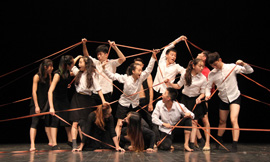
Evolution has brought suffocating high pressure to modern life. To meet their desires, people subconsciously step into a net impossible to shake off. The work describes the dilemma between a high speed city life and our pursuit for inner peace. Yang ChangGraduated from the Dance College in Korean National University of Arts and is currently a dance choreography teacher in Sichuan Conservatory of Music. From 2006 to 2010, as a dancer and a choreographer of Beijing Modern Dance Company, he had participated in important arts festivals in America, France, Britain, ltaly, Sweden, Finland and Spain, and started working on experimental dance, collaborating with celebrities such as Tian Zhuangzhuang and ChenKai-Ko. In July 2013, he was awarded the gold medal in the Second Session of Beijing International Ballet and Choreography Match.
Dance
2014